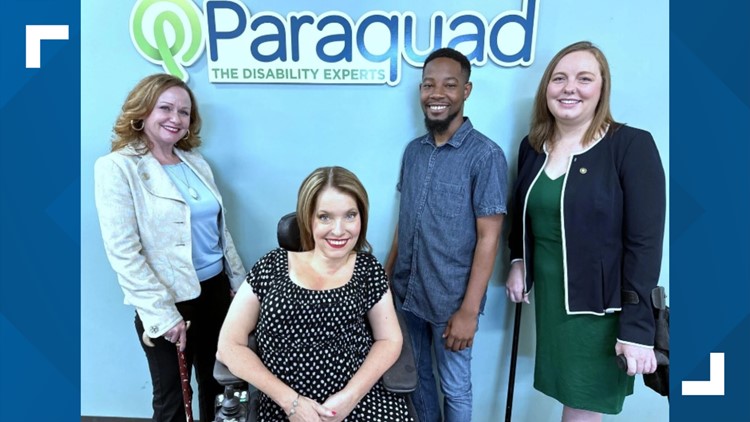You’re not forced to think about navigating transportation or physical facilities, finding affordable housing, a job or accessing adequate healthcare equipment or in-home assistance. You’re spared dealing with stereotypes prevalent in general society or popular media. Feelings of social isolation or exclusion, poverty, financial hardships, or thoughts of suicide are not things that occupy the minds of most able-bodied people.
Although 14th Ward Alderman Rasheen Aldridge, doesn’t consider his disability a necessary hindrance, he has empathy for those who have no choice but accept the designation and the challenges.
Aldridge was one of three elected individuals in Missouri living with disabilities who spoke at an event last week celebrating the 33rd anniversary of the signing of the Americans with Disabilities Act (ADA). The ADA was signed into law by President George W. Bush in 1999.
The July 21, 2023, celebration was hosted by Paraquad, one of the oldest and largest independent living centers in the country. The other guest speakers were state Rep. Bridget Walsh Moore (93rd district) and St. Louis County Councilwoman Kelli Dunaway.
“The ADA is more of a floor than a ceiling,” Paraquad’s press release read, adding: “There is much more to be done to truly reach a barrier-free society, the statement continued adding that the “lack of adequate access to affordable housing and transportation” are two of the biggest challenges the disabled community now faces.
Aldridge was born with a birth defect that resulted in his right leg growing significantly shorter in his mother’s womb than the left leg. Some infants born with such a condition must have one or both limbs amputated.
Aldridge was fitted with a prosthetis and after at least 16 surgeries, he said he’s now able to get around independently. Therefore, he doesn’t consider himself handicapped or disabled.
It wasn’t always that way.
Aldridge has two brothers, on his mother's side and nine siblings on his father's side. Family members, he said, prepared him for the “real world.”
“That meant cracking jokes about me to prepare me for how cruel kids can be,” Aldridge recalled, noting that he did, however, go through bouts of depression.
“There were times when I questioned God, asking ‘why did you make me like this?’”
As a kid, Aldridge said it was “particularly painful seeing himself walking in videos.
“I was disgusted realizing that that’s how other people saw me,” Aldridge reflected. “I wouldn’t say I was a depressed kid, but there were moments when I had depressed feelings and even suicidal thoughts over not wanting to be different.”
Aldridge said he’s not “super religious” but more spiritual. That disposition, he believes, helped him come to view his challenges more holistically.
“I’ve accepted it and I love it. It gives me something I can use to educate people or even sometimes crack jokes about; so, people know you don’t have to feel sorry for or treat people with disabilities differently.”
According to Paraquad, more than 1 ½ million Medicaid recipients have lost their coverage nationally since the public health emergency ended. Missouri was one of only two states that expanded its program, Mo HealthNet, during the pandemic. The federal government barred states from kicking anyone out of the program during the coronavirus pandemic, but those provisions ended in the spring.Areturn to Missouri's pre-pandemic Medicaid rules could mean hundreds of thousands might lose coverage.
Aldridge acknowledged the significance of ADA’s anniversary and the progress made in 33 years nationally and in Missouri. But, he adds, there’s still much work to be done.
“The ADA Act was a human rights thing to do. It provides protections and safety nets for disabled people, but we still live in a polarized world where there’s always a few people who want to treat you differently or be prejudiced or not allow you into certain spaces. We treat disabled people like we treat our veterans; we have sympathy for them, but we don’t really provide for them.”
Aldridge encourages the “able-bodied” to think outside themselves.
“They say, ‘you’re only one paycheck from being homeless.’ Well, we’re all just one situation away from having a life-changing situation where we could be in that spot.
“The reality is that people with disabilities are our dads and moms, our aunts, uncles, sisters and brothers and we all just want to be treated equally.”


